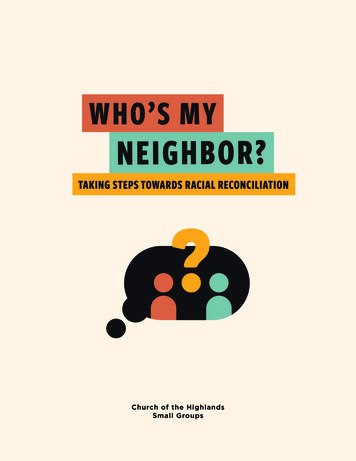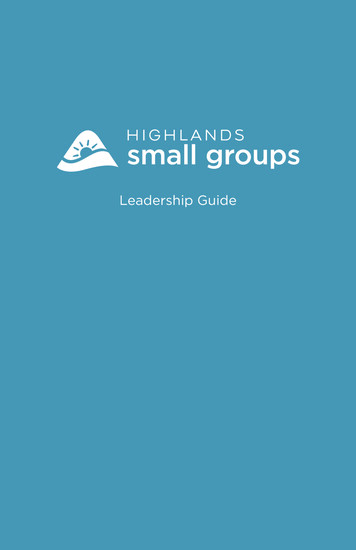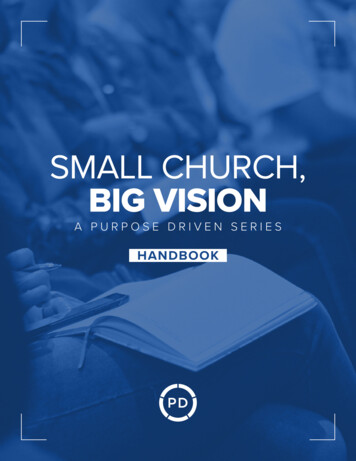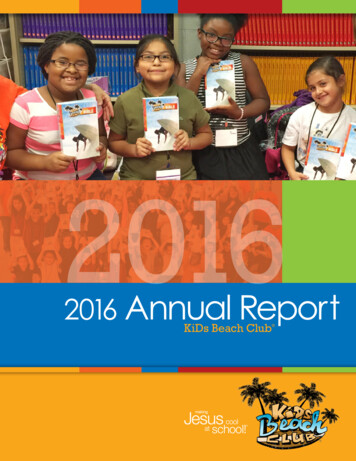
Transcription
Church of the HighlandsSmall Groups
03Introduction05Week One—The Value of Hard Conversations07Week Two—Empathy10Week Three—Who’s My Neighbor?12Week Four— Image Bearers14Week Five—Share a Meal15Week Six—Diversity17Week Seven—Overcoming Bias19Week Eight—Forgiveness21Week Nine—Justice23Week Ten—Our Role25Week Eleven—Unity27Week Twelve—Share a MealNote: Unless otherwise noted, all Scriptures are taken from the New International Translation(NIV). Other translations used in these materials are the New Living Translation (NLT),the English Standard Version (ESV), the Amplified Bible (AMP), and the New AmericanStandard Bible (NASB).2
When Jesus emphasized the second greatest commandment, that we are to “love ourneighbor as ourselves,” someone asked, “Who is my neighbor?” Jesus answered with astory about a man who crossed the racial divide to serve another man in need (Luke 10:2537). Reconciliation between races is very close to the heart of God. We see over and overthroughout Scripture that “every people, tribe, nation, and tongue” are a part of His Kingdom.Every person of every race is important to God, and He does not see any particular peoplegroup as more valuable than others. If we read the New Testament through the lens ofracial reconciliation, we will see this topic is frequently and passionately discussed. As Godreconciled us to Himself through Jesus, He also began the process of reconciling us to eachother. He greatly desires for His people to come together as one here on earth. As Paul saidin Galatians 3:28, “There is neither Jew nor Gentile, neither slave nor free, nor is there maleand female, for you are all one in Christ Jesus.”As Christians, we must fight for the reality of Heaven to be seen on earth: every peoplegroup equally valued, embraced, and supported. In this Who’s My Neighbor? Small Group,we will discuss God’s heart for diversity, the obstacles we face in America when it comesto justice and equality, potential barriers that might keep us from personally embracingdiversity in our own lives, and our responsibility as believers to be advocates for those whoare marginalized in our society. Our goal for this Small Group is for all of us to recognizeGod’s heart for racial reconciliation and to take steps together towards unity.Before we begin, let’s prepare our hearts. There are a few things we need to do in order tomake these conversations impactful and fruitful in our own lives and the lives of our fellowgroup members.1.Take on a posture of humility.Each of us is here to learn and grow. If we approach these discussions with humility,recognizing there is a lot we do not yet know, we will make great progress together. Aclosed mind and prideful heart are barriers that will prevent meaningful change.2. Seek to understand others.It’s more important to be understanding than to be right. Instead of trying to convinceother group members of our perspective, we should listen to their experiences and putourselves in their shoes. If we listen before we speak, we will be better equipped toempathize and love others well. And we will learn!3. Be honest and kind.It’s ok to not have all the answers. It’s ok to feel awkward and uncomfortable. It’s also okto say the wrong thing. We can only break down these barriers if we open up, push eachother to grow, and give grace to each other when we put our foot in our mouth. Let’screate a safe space to work things out together.3
We also want to set some Group Guidelines for this group to help lay the foundation for healthyconversations. We will go over these Group Guidelines at the beginning of each meeting.Group Guidelines1.2.3.4.5.6.7.8.9.10.Agree to make this a safe space for everyone in our group.Offer grace quickly.Take condemnation off the table.Give everyone an opportunity to speak.Use words like “me” and “you,” not “us” and “them.”Be comfortable with being uncomfortable.Engage in the conversation.Take risks and be willing to ask the “dumb” questions.Be respectful of others’ opinions and experiences.If you feel resistant to someone else’s perspective, pause before you speak. Ask Godwhy you feel that way.11. Listen to what God is saying to you, and respond.It’s going to be a powerful semester. Let’s get started!Please note: This curriculum is currently “in beta.” We are still learning and willcontinue to make this content better each semester. Please feel free to sendfeedback to smallgroups@churchofthehighlands.com.4
Week One—The Value of Hard ConversationsGet to Know Your GroupBefore we dive into the content for this group, let’s get to know each other first. Go aroundin a circle and share your name, a little bit about yourself, and why you decided to attend aWho’s My Neighbor? group this semester.Big IdeaThey say, “Nothing worthwhile ever comes easy,” and that is certainly true in the case ofracial reconciliation in America. History shows us that while many strides have been takenin the years since the Emancipation Proclamation towards the equality of all Americans,these strides have been hard-fought and hard-won at every turn. Even when we’ve seenimprovement, that improvement has come up short in one way or another, which is whyAmerica has had eight different “Civil Rights Acts” since the first one in 1866 grantedcitizenship to all people born in the United States, regardless of race. Though we have comea long way since then, a disparity in equality between races still exists in our society today,and many prejudices have been sustained through the generations, whether knowingly orunknowingly. We have more work to do!Talking about racial injustice and inequality is hard. There’s no doubt about it. There aremany valid emotional tensions bubbling beneath the surface of this topic. Many people donot feel heard when they try to speak up about racial injustice, causing deep frustrationor hurt. Many others do not feel equipped to engage in the conversation, afraid to say thewrong thing. The fear of causing offense or being offended has caused most of us to dodgethis conversation at some point in our lives. But we are coming to the table today becausewe know justice is more important than our comfort.Each of us has a role to play, and the first step is to lean into the conversation about race.That’s why we’re so excited about this Small Group. As we choose every week to engagein discussion, we will peel back layers and discover new things about ourselves and thepeople around us. We will learn to speak about matters of race with both grace and Biblicalauthority. We will become equipped to advocate for those who are suffering injustice. Andwe will grow in our ability to develop deep, meaningful relationships with people who donot look like us. It may not always be easy. Chances are, at some point this semester, each ofus will either offend someone else, be offended, or both. We have to give each other spaceto say the wrong thing in this group. In the end, it will be worth it. Awkward is the only wayforward, so let’s embrace the discomfort, have the hard conversations, show each othermercy, and become united in our heart for racial reconciliation and justice.5
ScriptureSo whatever you say or whatever you do, remember that you will be judged by thelaw that sets you free. There will be no mercy for those who have not shown mercyto others. But if you have been merciful, God will be merciful when He judges you.James 2:12-13 NLTWounds from a friend can be trusted, but an enemy multiplies kisses.Proverbs 27:6Discussion Questions In what ways have you engaged with the topics of racial reconciliation and justice inthe past?What is one fact about America’s history with race that has left an impression on yousince you learned it?What are you hoping to get out of this Small Group? How do you want to be differentat the end of the semester?Action StepDecide in your heart to approach this Small Group with humility and grace. Commit tolistening, learning, and lamenting when others share painful experiences. Ask God to giveyou an open mind and heart so that you can receive truth and use what you learn to affectchange in the world around you. Also, take some time this week to learn more aboutAmerica’s history with race through a documentary or podcast.PrayerFather, thank You for leading me to this Small Group this semester. I know racial reconciliationand justice are Your heart for mankind, and I want to learn how to be an agent of changefor what is important to You. I’m grateful for the opportunity to learn, grow, and become anadvocate for justice. Help me be open-minded, humble, gracious, and brave as I navigatethese conversations this semester.6
Week Two—EmpathyBig IdeaRead John 11:1-35.In this passage, Jesus sets a powerful example for us in how to live in relationship withothers. He models a trait that will be crucial in our efforts towards unity and reconciliation:empathy. When Jesus was just moments away from raising Lazarus from the dead, Hestopped to feel what Lazarus’ sisters were feeling. He knew how Lazarus’ story would endand even said it plainly (“This sickness will not end in death” – verse 4), but He still took amoment to weep with His friends who were hurting deeply. Jesus didn’t weep out of fear orhopelessness; He wept out of love. His love for His friends compelled Him to take on theirpain and feel the weight of it personally. In sharing what Lazarus’ sisters felt in that momentof despair, He communicated great love and value to them.Theologian Greg Boyd says, “Love ascribes worth to others at cost to yourself.” Empathyvalidates the feelings of others and gives them worth and weight, even when ourperspectives might be different. When we take the time to empathize, we deepen ourbond with one another by saying, “I see you, and I want to know more about what you’veexperienced.” Offering this opportunity for connection and validation is a gift to others.It gives them freedom to be open and fully themselves. It will ultimately enrich our livesas well, experiencing the unifying effects of truly feeling with others. Empathy is key tooneness.The journey towards reconciliation will require each of us to meet others where they are:to be willing to lay our own perspectives and experiences to the side in order to betterunderstand the other person. When we practice empathy, we allow someone else’semotional experience to impact our hearts. While this practice does not necessarily alwayslead to agreement about a particular issue, it does lead to deeper connection with the otherperson. And often, we will find ourselves compelled to partner with them and act on theirbehalf. Truly feeling what other people feel not only promotes oneness but can renew ourpassion for justice. Empathy is a powerful, important aspect of the work we will do in thisgroup.Empathy specialist Justin Masterson has developed a practical way to think about andpractice empathy in our conversations with others. Remember DIRO1: D – Decide that the other person is worthy of our empathic connection. We need to choose to recognize the worth and validity of their human experience.The world has affected them in a real way. We must choose not to dismiss them.Justin Masterson and SEEK CompanyContent used with permission from undivided.com17
I – Identify their emotional experience. Our emotional response to a situation they’ve responded to emotionally may bedifferent. Instead of focusing on the context of the situation, we need to focus onthe emotion.R – Recall a time when we felt a similar emotion. In doing so, we are recognizing a shared experience and a shared humanity. Note: This is all going on in our heads. We aren’t necessarily stopping the person tosay, “Hey, I’ve had that feeling!” We are allowing ourselves to associate our humanitywith theirs.O – Observe our own reaction. We need to acknowledge how the person’s story is making us feel. What is it doingto our hearts? When we acknowledge that reaction, we give that feeling validity and purpose.This often causes us to ask deeper follow-up questions like, “What was it like, toexperience that?” or “What did you need in that moment?” Asking these questionsallows us to form a greater connection as we learn more about the other person.As we grow in the skill of empathy, we will make great progress towards our goal ofreconciliation.ScriptureWhen Mary reached the place where Jesus was and saw Him, she fell at His feetand said, “Lord, if you had been here, my brother would not have died.” When Jesussaw her weeping, and the Jews who had come along with her also weeping, He wasdeeply moved in spirit and troubled.“Where have you laid him?”He asked. “Come andsee, Lord,” they replied. Jesus wept.John 11:32-35Be happy with those who are happy, and weep with those who weep.Romans 12:15 NLTEmpathy ExerciseToday, we are going to view 8 provocative images that have something to do with theconversation on race. As each image is shown, silently identify your immediate emotionalresponse to that image.Once we have gone through all 8 images, we will take a minute to silently reflect on whichimage we had the strongest reaction to, and we will try to identify why we had that reaction.Discussion Questions 8Which of the images did you have the strongest reaction to, and why? As you listen toyour fellow group members share, try to practice DIRO. Identify the emotional response,relate to that emotion, and lean in to ask follow-up questions. Work to understand whythey feel the way they do.Discuss this exercise and how it made you feel. What did you learn?How do you think empathy will help us on this journey towards reconciliation? How doyou feel right now about this challenge to grow in empathy this semester? (Excited,intimidated, eager, hesitant, etc.)Content used with permission from undivided.com
Action StepTalk to a friend or family member about the concept of empathy this week. Process howyou’re feeling about the challenge to give other people’s perspective weight and worth,even when it’s different from yours. Identify any hesitations you have within you, and bringthem to God in prayer. Ask Him to help you grow in your ability to empathize with othersand learn to love people more deeply throughout the semester.PrayerJesus, thank You for purposely experiencing everything we experience here on earth sothat You could understand us. We know that because You know how we feel, You activelyadvocate for us before the Father. Help us to truly feel with other people like You do. Helpus to validate other people’s experiences like You do. Move us to advocate for others theway You advocate for us. Thank You for loving us with kindness, grace, and empathy. Helpus be like You.Content used with permission from undivided.com9
Week Three—Who’s My Neighbor?Big IdeaWhen Jesus emphasized the second greatest commandment, that we are to “love ourneighbor as ourselves,” a lawyer asked for some clarification: “Who is my neighbor?” Inresponse, Jesus told the story of the Good Samaritan who was traveling to Jericho when heencountered a Jewish man dying on the side of the road. The man had been robbed, beatenand left for dead. A Jewish priest and a Levite, traveling on the same road earlier that day,had each seen the man and chosen to look away, cross to the other side of the road, andkeep walking. The Samaritan, however, stopped to help the man. With a backdrop of racialtension between Samaritans and Jews, Jesus’ message rang clear to His listeners that weare to love everyone. Unity and racial reconciliation are the heart of God. He longs for us tosee each person as masterpiece, created in His image.There are four things the Good Samaritan did in loving his Jewish neighbor that we canlearn from as we seek racial reconciliation. First, he saw the man lying on the road anddid not turn his gaze. He saw his pain. Second, he had compassion for the man. Unlike thepriest and Levite who focused on their own needs and what could possibly be at stakefor them if they got involved, the Samaritan focused on the needs of someone else andrecognized that this man’s life was at stake. Third, he went to him and engaged with him. Inorder to love the Jewish man, he could not stay standing on the other side of the road; heneeded to go be with him. Lastly, the Samaritan took action and served the wounded manby bandaging him, taking him to an inn to heal, and even personally covering the cost ofhis care. We, too, can love our neighbors—which includes everyone, regardless of race—byseeing and acknowledging them and their pain, having compassion for them, engaging inrelationship with them, and serving them.Scripture“‘Love the Lord your God with all your heart and with all your soul and with all yourstrength and with all your mind’; and, ‘Love your neighbor as yourself.’”Luke 10:27“Which of these three do you think was a neighbor to the man who fell into the handsof robbers?” The expert in the law replied, “The one who had mercy on him.” Jesustold him, “Go and do likewise.”Luke 10:36-3710
Discussion Questions What feelings do you think the different characters in this story experienced? (Thelawyer, the priest, the Levite, the Samaritan, and the Jewish man hurting on the side ofthe road)The Samaritan crossed the racial and cultural divide and saw the pain and need of theJewish man. What are some of the needs and pain people experience who are frombackgrounds different than yours?What does the phrase “I don’t see color” mean to you? Discuss the implications of thisstatement.Action StepThis week, commit to truly seeing the people God brings across your path – this includesseeing their pain, their history, their culture, and their heart. Ask God to stir compassion inyour heart, and look for ways to meet their needs and serve them.PrayerJesus, thank You for teaching me what love looks like. Help me to see all people as myneighbors and love them well. Stir my heart with compassion and show me how I can servethe people I meet each day.11
Week Four—Image BearersBig IdeaWhen we see a silver apple, golden arches, a red target, or a cross, we immediately associatethem with specific things: Apple products, McDonald’s, Target superstore, Jesus Christ.Since the beginning of time, we have been conditioned to associate certain things, andtheir value, with the images we see. The Apple logo speaks of high-end technology; thebig, yellow “M” makes us hungry for a quick, inexpensive meal. When God wanted to createa visual image of who He is, He made us—human beings. The Bible says in Genesis 1:26-28that we were “created in the image and likeness of God.” Not long after we were created inGod’s image, the schemes of satan began to distort this in our minds, and sin was broughtinto the world. The enemy has attempted to “brand” us with his lies ever since. Insteadof seeing the image of God in each other, the history of sin has conditioned us to see thevarying shades of humanity as images to categorize. Instead of a consistent association asthe reflection of God, we are the sum of often divisive and devaluing experiences. This is alie! The truth is that as bearers of His image, we are His reflection in the world. It’s time torebrand ourselves, and get back to God’s original plan!Because we are made in the image of Almighty God, whose value is without limit, we, too,are invaluable in His Kingdom. All of us—regardless of race, ethnicity, or socio-economicstatus. Red, yellow, black, brown, and white faces all reflect the image of the same God andhave the same inherent value and worth. When we devalue someone else because of theirskin color, we overlook God’s image in them and subsequently devalue Him. All races werecreated to look like their Creator. To insult an image-bearer is to insult God Himself. Whenlooking at any person, it is vital for us to see God’s image within them. Knowing the value ofGod is reflected in that person, we will be inspired to treat them with the honor and respectdue to our Creator and King.ScriptureThen God said, “Let us make mankind in our image, in our likeness, so that they mayrule over the fish in the sea and the birds in the sky, over the livestock and all thewild animals, and over all the creatures that move along the ground.” So God createdmankind in His own image, in the image of God He created them; male and femaleHe created them.Genesis 1:26-27Discussion Questions 12What do you think it means to “devalue” someone? Describe a time in your life whenyou felt devalued.
Do you feel the opinions of people who look, speak, or act different than you are asimportant as the opinions of those who look, speak, and act like you?How would looking for God’s image in others change the way you feel about them andvalue them?Action StepAs you encounter people this week, take a moment to acknowledge God’s image withinthem before you speak to them. This practice will help you approach others with respect andhonor. Pay attention to whether or not this changes the way you interact with them. Noticingthese things will help you identify any biases you have that you need to overcome.PrayerFather, thank You for creating me, and all people, in Your image. Help me to see the value weshare as image bearers. I rebuke the lies the enemy has used to blind me from seeing Yourreflection in others. Help me to love and honor every person I encounter.13
Week Five—Meal TimeBig ssion Questions One Two ThreeAction StepStepsPrayerPrayer
Week Six—DiversityBig IdeaIn our world today, we are seeing a new push and emphasis on “diversity.” Leaders ofcompanies, organizations, and educational institutions across the country are re-evaluatingtheir leadership models and emphasizing diverse representation in student bodies, staff,and marketing materials. Though our society is becoming more aware of the importance ofdiversity, this isn’t at all a new concept to our God. He created a diverse world on purpose,for a purpose. Across a diverse human race, we see the image of God. We cannot get thefull picture of who He is without all the pieces of the puzzle. The Body of Christ is not wholewithout diversity.As Christians, God desires for us to live life embracing diversity. Part of the answer tothe prayer, “Your Kingdom come,” is seeing the visual reality of Heaven manifest in ourcommunities. When we look around at our Small Groups, our children’s soccer teams, andour dinner tables, the hope is that we will see the same spectrum of faces that we will oneday see in Heaven, as “every nation, tribe, people, and language” come together before thethrone to worship Jesus (Revelation 7:9). We have the opportunity to start building thiskind of community today! We can begin to intentionally enlarge our circle to include peoplethat are of different races and socioeconomic backgrounds. We need to seek out peoplewith different perspectives and experiences and give them a seat at our table. It is God’s willfor us to do life all together. When we do, we will truly see the wholeness of His image andexperience the fullness of Kingdom life!ScriptureJust as a body, though one, has many parts, but all its many parts form one body,so it is with Christ. For we were all baptized by one Spirit so as to form one body—whether Jews or Gentiles, slave or free—and we were all given the one Spirit to drink.Even so the body is not made up of one part but of many.1 Corinthians 12:12-14After this I looked, and there before me was a great multitude that no one couldcount, from every nation, tribe, people and language, standing before the throne andbefore the Lamb.Revelation 7:9“This, then, is how you should pray: ‘Our Father in heaven, hallowed be Your name,Your kingdom come, Your will be done, on earth as it is in heaven.’”Matthew 6:9-1015
Discussion Questions Why do you think God values diversity? Why is it important for each of us (and fororganizations and institutions) to value and champion diversity?Do you see the value other races and cultures bring to the world? What kinds ofhesitations do you think you might have about embracing diversity in your life?Looking at your circle of friends, how intentional have you been to create a diversecommunity? What can you do to enlarge your circle? What can you do to diversify yourcircle?Action StepIt’s time to enlarge your circle! Look for opportunities this week to connect with peoplewhose race and background are different than yours. Ask a coworker to coffee, inviteanother student to sit with you at lunch, or reach out to an acquaintance on social media.Ask questions (be sensitive and kind), listen, and enjoy discovering more of who God is asHe is reflected more clearly in the faces around you.PrayerFather, thank You for giving me an opportunity to see Your image wholly in the diversityof my community. Help me to embrace those who are different from me. Help me see thebeauty and value You see in each person. Show me if I have anything in my heart that keepsme from fully embracing people from different backgrounds, and help me get rid of it. LetYour Kingdom come on earth as it is in Heaven, and let it begin with me!16
Week Seven—Overcoming BiasBig Idea“Prejudice” is a preconceived notion about a person or group of persons based on theirculture, race, background, ethnicity, socioeconomic status, age, etc. When we are prejudiced,we “pre-judge” someone based on stereotypical factors associated with their particularpeople group. This creates a bias, or a mindset, that causes us to favor one group overanother. Unfortunately, all of us are prejudiced in some form or fashion, whether we know itor not. Most of the time, we develop these mindsets from a young age due to the influenceof our families, our school environments, or media. These unbiblical perspectives ingrainedby our upbringing develop what is called “unconscious bias.” While we might not havechosen to have these prejudices, we are now responsible for what we do with them. If wewant to engage others with the love of Jesus, we have to do intentional work to identify ourunconscious biases and actively remove them from our mindset towards others.This work requires us to consider different people groups and our initial responses topeople in those groups. What stereotypes do we tend to assign to a specific group? Whatis our mindset when approaching someone from that group? It may be helpful to thinkback to childhood and how our families talked about certain people groups. What was ourimpression of people of a certain race or background when we were in elementary school?What about high school? After we have identified any prejudices we have, we need to focuson changing the way we think. The first step is to adopt a mentality of “us” and “we” ratherthan “them” and “they.” Assigning labels or putting people in categories will never help usovercome bias and will only limit the relationships we develop with others. “They” separates“us” from “them.” We have to remember that we are one body in Christ Jesus. We arebrothers and sisters, valued equally by God, given equal access to His power, and equallycapable of doing extraordinary things for His glory.It’s important to note that being one and equal before God does not mean that ourspecific heritages, cultures, or histories aren’t significant or relevant! We can celebrate ourdifferences while rejoicing that we have been grafted together into the family of God. Ourunique earthly experiences should not determine how we communicate and fellowship withone another. We are truly family!ScriptureMy fellow believers, do not practice your faith in our glorious Lord Jesus Christwith an attitude of partiality [toward people—show no favoritism, no prejudice, nosnobbery]. For if a man comes into your meeting place wearing a gold ring and fineclothes, and a poor man in dirty clothes also comes in, and you pay special attentionto the one who wears the fine clothes, and say to him, “You sit here in this good seat,”and you tell the poor man, “You stand over there, or sit down [on the floor] by my17
footstool,” have you not discriminated among yourselves, and become judges withwrong motives? Listen, my beloved brothers and sisters: has not God chosen thepoor of this world to be rich in faith and [as believers to be] heirs of the kingdomwhich He promised to those who love Him? But you [in contrast] have dishonoredthe poor man. Is it not the rich who oppress and exploit you, and personally dragyou into the courts of law? Do they not blaspheme the precious name [of Christ] bywhich you are called?If, however, you are [really] fulfilling the royal law according to the Scripture, “Youshall love your neighbor as yourself [that is, if you have an unselfish concern forothers and do things for their benefit]” you are doing well. But if you show partiality[prejudice, favoritism], you are committing sin and are convicted by the Law asoffenders. For whoever keeps the whole Law but stumbles in one point, he hasbecome guilty of [breaking] all of it. For He who said, “Do not commit adultery,”also said, “Do not murder.” Now if you do not commit adultery, but you murder, youhave become guilty of transgressing the [entire] Law. Speak and act [consistently]as people who are going to be judged by the law of liberty [that moral law that freesobedient Christians from the bondage of sin]. For judgment will be merciless to onewho has shown no mercy; but [to the one who has shown mercy] mercy triumphs[victoriously] over judgment.James 2:1-13 AMPTherefore let us stop passing judgment on one another. Instead, make up your mindnot to put any stumbling block or obstacle in the way of a brother or sister.Romans 14:13Discussion Questions What are some stereotypes associated with your background (or backgrounds)?How does making assumptions about others keep us apart?What is a bias you unconsciously developed as a child? How do you think it was passeddown to you? Were you aware of it before this grou
2 03 Introduction 05 Week One—The Value of Hard Conversations 07 Week Two—Empathy 10 Week Three—Who's My Neighbor? 12 Week Four— Image Bearers 14 Week Five—Share a Meal 15 Week Six—Diversity 17 Week Seven—Overcoming Bias 19 Week Eight—Forgiveness 21 Week Nine—Justice 23 Week Ten—Our Role 25 Week Eleven—Unity 27 Week Twelve—Share a Meal Note: Unless otherwise noted .











